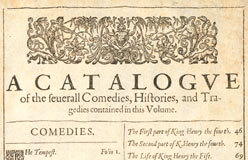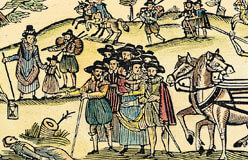Shakespeare’s tragedies share some of the same elements as his comedies.
But the problems the hero faces are so great that the play ends in death. The Greek philosopher Aristotle tried to explain why audiences “enjoy tragedies.” He said it was “the tragic pleasure of pity and fear.” For example, Shakespeare’s Othello is a brave general who is tricked by the evil Iago into killing his wife out of jealousy. We pity Othello because he is noble yet flawed. But we are also afraid of being like him.
Shakespeare’s greatness doesn’t come from his plots. He borrowed them from novels, histories, and even other plays. Hamlet may be the world’s most famous play. It’s also a typical Elizabethan revenge tragedy. The story is centered around a father’s ghost telling his son to avenge his murder. But Shakespeare’s creative use of language turns these old stories into great dramas. Before theaters had realistic scenery and lighting, people spoke of “hearing” plays rather than seeing them. Shakespeare’s complex characters allow actors to play them in different ways. That means audiences can enjoy seeing the same play more than once.







